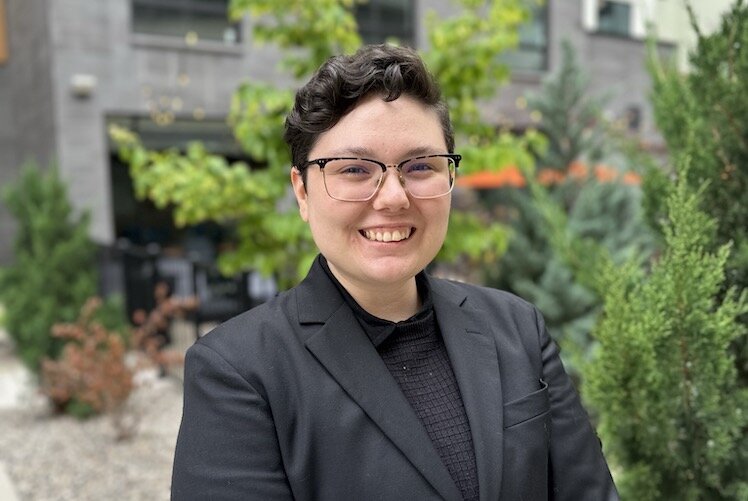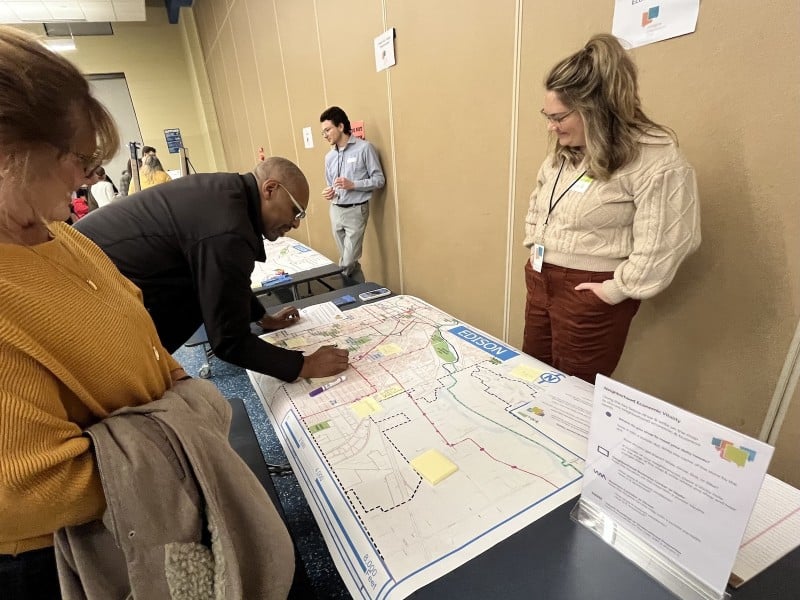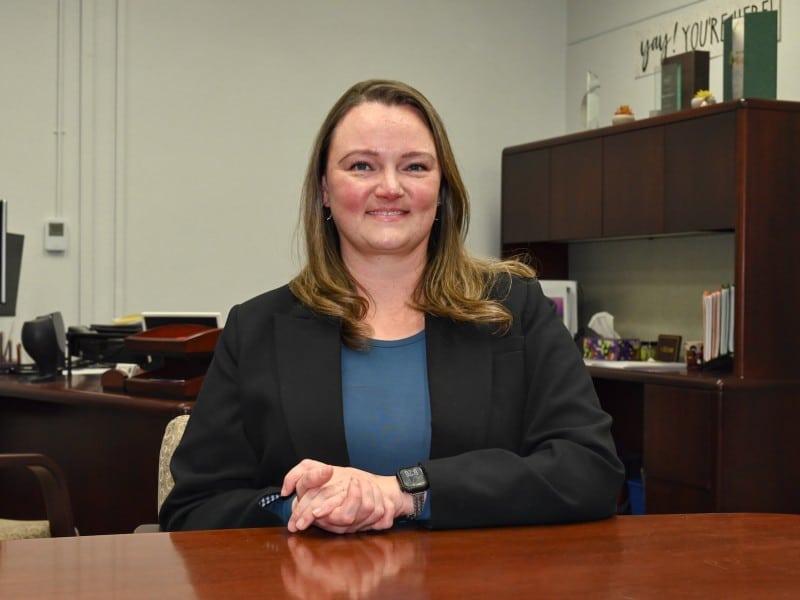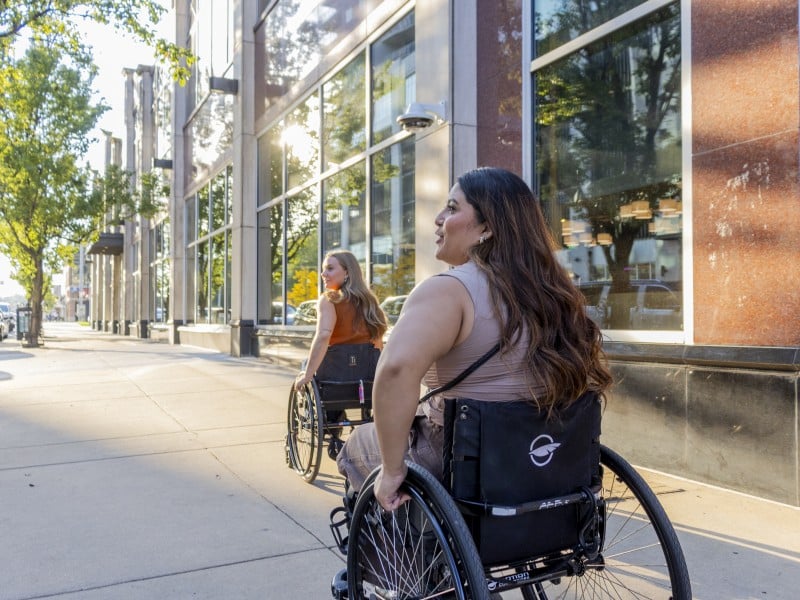Care about the climate? Meet Kalamazoo County’s new Climate Sustainability Coordinator
Taylor Van Winkle has been hired as the new Kalamazoo County Climate Sustainability Coordinator to complete a job — the creation of a countywide climate action plan. And she needs the help of residents. Care about the climate? Take the survey to help inform the plan.

Kalamazoo County hired a Climate Sustainability Coordinator in July — a first for the county — to develop a climate action plan. This plan will suggest ways the local government can combat climate change, promote sustainable practices, and rectify climate injustice. Taylor Van Winkle, formerly an Associate Planner for the City of East Lansing, has assumed the inaugural position funded in part by the Kalamazoo Climate Crisis Coalition’s three-year, $300,000 grant awarded by the United States Environmental Protection Agency through the Michigan Department of Environment, Great Lakes, and Energy in 2022. Van Winkle discussed the specifics of developing the climate action plan, as well as how they intend to focus their efforts.
What is the goal of the climate action plan?
“To create a cohesive document that targets local climate action issues as well as climate justice issues,” says Van Winkle, adding that “it’s not one and then the other or one or the other.” When it comes to Van Winkle’s perspective on sustainability, they say, “It shouldn’t ever be one methodology,” and that “increasing resilience and sustainability should happen at multiple scales and in multiple different ways.”
What is the methodology for constructing a county-wide climate action plan?
“It’s going to be grounded in outreach and public input,” says Van Winkle, emphasizing that there will be “multiple stages” of feedback for the community to voice their ideas and opinions. The first step in this process is a short community survey to assess the needs of the county. This five-minute survey can be found HERE and is open for responses until the end of the year.
To create an action plan for the entire county, many municipalities, staff, academic institutions, and other nonprofits will be consulted and involved, says Van Winkle. Kalamazoo Climate Crisis Coalition (KCCC), with whom the grant was secured, has been the initial point of contact. Van Winkle is “attending their meetings and discussing [their] progress with them.” Additionally, KCCC’s existing network of community organizers and contacts within the community will prove invaluable in getting access to input for the action plan.
The Kalamazoo Valley Community College Food Hub and the Office for Sustainability office at Western Michigan University are other organizations that will provide instrumental insight.
Another step is the creation of an advisory board. While the grant is administered by KCCC and the county, implementation and creation are overseen by an advisory board consisting of community members, leaders of organizations, experts in the field, and local business owners.
What does your day-to-day look like?
“One, research… Two, reaching out to individuals,” says Van Winkle. They say meetings with department heads and others within the county bureaucracy to identify “programs that can be expanded or assisted.” Extending input to county municipalities is another prerogative. Additionally, data collection and analysis, such as the community survey, is a key aspect of the position, helping to construct a plan based on quantitative factors.
How are the funds from the grant being used?
“Funding, salary, and support for staff,” says Van Winkle, as well as for the “urgent [and] necessary” projects that are relatively easy to implement.
What happens after the three-year grant period?
“We’re going to have a plan that has gone through a rigorous process internally and with the public,” says Van Winkle. It will go through the county commission process by the end of the second year with the third year focused on implementation. By the end of the three years, there will be a plan with some “shovel-ready” projects already begun. However, as of now, there is no funding to continue the position of sustainability coordinator, and without the grant, it is not a designated position within the county. Van Winkle says while the scope of their current work is the climate action play, they may continue working with the county in a related capacity when grant funding terminates.
What specific community organizations are you planning to reach out to?
“ [The] Kalamazoo Conservation District, which represents a lot of the rural area in the county,” is an important contact when considering the entirety of Kalamazoo County, says Van Winkle. “Making sure agriculture and food systems are being heard,” Van Winkle adds, is key to developing a thorough action plan. Faith-based organizations will also be consulted to access broader demographics.
“Kalamazoo County is uniquely poised to tackle a climate action plan,” notes Van Winkle, due to the long history of “support for climate action” by the local population.
How will you ensure that marginalized communities provide input?
“Online forms that are easy to access,” is the primary way in which input will be accessible, says Van Winkle. The initial community survey is online and accessed through a QR code that any smartphone can read. Additionally, they are exploring the “opportunity for targeted mailing for communities that aren’t exposed to the option” of online surveys and providing mail-in forms, Van Winkle says. The surveys are to be targeted and concise so as not to preoccupy the responder.
How will the plan incorporate rural communities?
“Working with local municipalities, township boards, town halls, having presentations that are accessible” to those communities, and providing flexibility to accommodate schedules are imperative, says Van Winkle.
How will you ensure that the climate action plan is implemented?
Currently, the action plan will serve as a recommendation to the county that will then go through an approval process after the project is completed. “We’re going to start by making sure we have a quality plan,” says Van Winkle, “and that the solutions we’re offering are meeting the needs” of the people.
The next step is to make sure that the community, along with the heads of the county departments, know the value of the action plan and have a clearly marked path toward implementation. “Having a dedicated staff member there to guide” implementation will be paramount to the plan’s success, Van Winkle says.
When asked about possible alterations in implementation due to political changes, Van Winkle commented “Climate action is apolitical,” and that the effects of the action plan will help those across the political spectrum, reaping benefits that will demonstrate to everyone the value of sustainability.
How much money is the county willing to put forward to the plan?
“That has yet to be determined.” However, Van Winkle adds that there are currently many funding options, including state and federal grants. Additionally, “the recent state budget…allocates a lot of funding” for sustainable infrastructure, says Van Winkle. Although, “grants are available but not sustainable,” Van Winkle says, advocating for a combination of both public funding and grants to sustain sustainability initiatives.
How are you planning to work with utility companies to develop sustainable practices?
“We will reach out; we will be connecting with them,” says Van Winkle. They add that communicating with utility companies and crafting a strategy that accounts for the interests of the business and the people can be achieved. Van Winkle does not “see collaboration as a negative or a barrier in any way.”
How will you help people adapt to the paradigm shift that comes with sustainable living?
“The key to getting a shift in individuals’ lifestyles is making it the easiest choice available.” If an option has the “fewest barriers to entry,” then more are willing to take that step, says Van Winkle. For example, residents are more willing to recycle if there is a service to pick it up. Incentivizing sustainability is the way to enhance participation.
The development of a climate action plan will provide the county with a detailed plan that will carve a clear path to a more sustainable and equitable Kalamazoo.
















